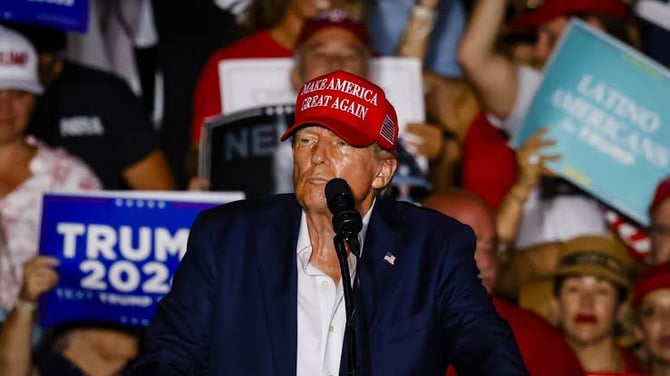What a Trump Re-Election Could Mean for Europe’s Economy

Goldman Sachs economists suggest that a second term for Donald Trump could significantly impact the euro area’s economy. Growing market expectations of a Trump win have prompted analysis of potential repercussions, particularly concerning trade policy, defense spending, and U.S. domestic policies.
Analysts forecast a substantial 1% decline in the euro zone’s GDP and a modest 0.1 percentage point increase in inflation if Trump returns to office. Trade policy uncertainty, heightened defense and security pressures, and spillover effects from U.S. domestic policies could all affect Europe.
On the defense front, Trump’s potential reduction or cessation of U.S. aid to Ukraine and reluctance to support NATO countries not meeting defense spending requirements could compel European nations to increase their defense budgets. Goldman Sachs estimates that European countries might need to allocate an additional 0.5% of GDP to defense annually, with modest economic growth from this spending. Geopolitical uncertainties and risks could also arise concerning the U.S. commitment to NATO.
What Does This Mean For Me?
Trade tensions could resurface under Trump, similar to those during his first term when tariffs on European steel and aluminum led to retaliatory duties from the EU. Introducing a proposed 10% tariff on all U.S. imports, including those from Europe, would likely elevate trade policy uncertainty, negatively impacting the euro area’s industrial production by approximately 2%, as seen in 2018-2019. Countries like Germany, heavily reliant on industrial output, would be particularly affected.
More News
.webp)
Japan’s Rate Shift Is Rippling Through Global Bond Markets
1 week ago

China’s Growth Engine Stalls as Consumers and Investors Pull Back
2 weeks ago

Egypt’s Recovery Gains Traction as Household Pressure Lingers
3 weeks ago

OECD Warns AI and Tariffs Will Test the Global Economy
3 weeks ago

Zero Tariffs, Higher Drug Bills as US and UK Reset Pharma Trade
3 weeks ago

Catastrophe Bonds Go Global as Climate Risk Meets Yield Hunting
1 month ago
.webp)
Canada Shields Steel and Lumber Industries From Tariffs
1 month ago

Trump Drops Selected Tariffs in Response to Inflation Pressures
1 month ago